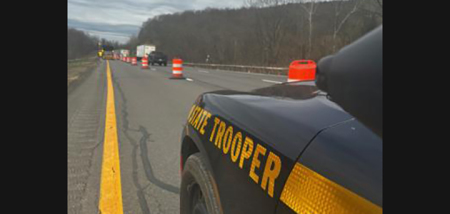Remember To Check Smoke Alarms And CO Detectors This Winter
Published:
January 2nd, 2024
By:
Sarah Genter
 To help protect against fires and carbon monoxide (CO) poisoning, homeowners should ensure CO detectors and smoke alarms are on every floor of the home, with smoke alarms placed in all bedrooms, common areas, and dining rooms. (Sun file photo)
To help protect against fires and carbon monoxide (CO) poisoning, homeowners should ensure CO detectors and smoke alarms are on every floor of the home, with smoke alarms placed in all bedrooms, common areas, and dining rooms. (Sun file photo)
CHENANGO COUNTY — With colder temperatures on the horizon, City of Norwich Fire Chief Jan Papelino is reminding area residents to check their smoke alarms and carbon monoxide (CO) detectors.
He said fires and CO leaks are more common in the winter months due to both the increased use of and strain on home heating systems, as well as a lack of proper maintenance.
“Their heating systems are working harder, and especially this time of year a lot of people heat with wood. There are structure fires that are started due to chimney fires due to increased silt build up,” he said. “If you do burn wood, it requires regular maintenance and just cleaning the chimney, the pipes, checking them, making sure the flue inside the chimney doesn’t get cracked.”
Cracks in heating unit flues can also cause leaks of carbon monoxide, which is toxic and can be deadly if inhaled.
“If the flue on them is cracked it could leak carbon monoxide gas out into the heating system that could potentially go out into the rest of the house,” Papelino explained. “If you’ve got all electric appliances you don't need to have CO detectors, because some places do; they’ve got electric hot water, and electric baseboards and that kind of stuff. But if you've got natural gas, fire, or propane, fuel oil, or a wood burning device, pellet stove, you should have CO detectors in your residence.”
He said CO detectors should be installed on every floor of the home, as they could potentially save lives. Carbon monoxide is an odorless, colorless, tasteless gas, making it impossible to sense without the help of a detector.
“It’s odorless, it’s tasteless. You aren't going to sense it,” said Papelino. “You can’t smell it, can't taste it. That’s why they call it the silent killer.”
Papelino said common symptoms of CO poisoning are headaches, lethargy, and nausea. However, he said symptoms can be so similar to flu-like symptoms that oftentimes when individuals are suffering from CO poisoning, they mistake it for illness.
“When we go to any of the medical calls that we go on we have a CO detector on every one of our first aid med bags, and that’s all it measures is CO. But you’d be surprised the number of times our crews have gone to somebody that comes in as an illness, and we walk in the door and that meter goes off,” Papelino said.
To help protect against fires, Papelino recommends installing smoke alarms on every floor of the home, in every bedroom, in common areas outside of bedrooms, and in dining rooms.
He said smoke alarms in kitchens are not always necessary, as smoke during cooking is common, and individuals are more likely to remove them.
“Those are the ones that people have a tendency to pull the batteries out of or take them off the wall and set them on the floor,” said Papelino. “We’ve found a couple places where they had smoke in the structure and we found the smoke detectors laying on the floor, which does little good when they're not up where they’re supposed to be, up high.”
Papelino also said to check smoke alarm batteries and replace them if necessary, especially for alarms that are hardwired into the home’s electricity. In the event of a power outage, charged batteries will work as backup power and keep smoke alarms functioning.
He recommends regular maintenance and upkeep of all heating systems as well, which can prevent fires and CO leaks.
“No matter what your heating system is you should have it serviced on a regular basis,” he said. “Change your filters, your air filters on your furnace or your heating system, on a regular basis.”
Author: Sarah Genter - More From This Author
Comments







